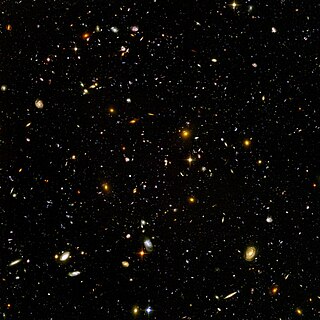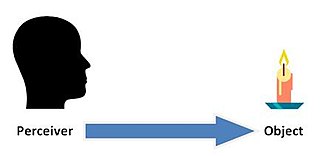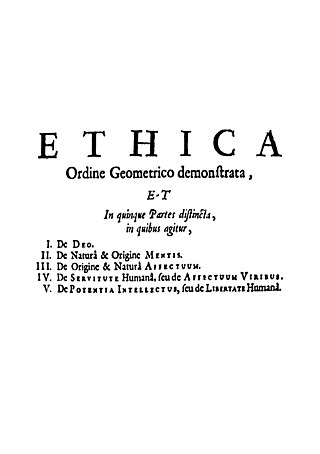
Idealism in philosophy, also known as philosophical idealism or metaphysical idealism, is the set of metaphysical perspectives asserting that, most fundamentally, reality is equivalent to mind, spirit, or consciousness; that reality is entirely a mental construct; or that ideas are the highest form of reality or have the greatest claim to being considered "real". The radical latter view is often first credited to the Ancient Greek philosopher Plato as part of a theory now known as Platonic idealism. Besides in Western philosophy, idealism also appears in some Indian philosophy, namely in Vedanta, one of the orthodox schools of Hindu philosophy, and in some streams of Buddhism.
Materialism is a form of philosophical monism which holds that matter is the fundamental substance in nature, and that all things, including mental states and consciousness, are results of material interactions of material things. According to philosophical materialism, mind and consciousness are by-products or epiphenomena of material processes, without which they cannot exist. Materialism directly contrasts with idealism, according to which consciousness is the fundamental substance of nature.

The mind is that which thinks, imagines, remembers, wills, and senses, or is the set of faculties responsible for such phenomena. The mind is also associated with experiencing perception, pleasure and pain, belief, desire, intention, and emotion. The mind can include conscious and non-conscious states as well as sensory and non-sensory experiences.

Physics is the natural science of matter, involving the study of matter, its fundamental constituents, its motion and behavior through space and time, and the related entities of energy and force. Physics is one of the most fundamental scientific disciplines, with its main goal being to understand how the universe behaves. A scientist who specializes in the field of physics is called a physicist.
In philosophy, physicalism is the metaphysical thesis that "everything is physical", that there is "nothing over and above" the physical, or that everything supervenes on the physical. Physicalism is a form of ontological monism—a "one substance" view of the nature of reality as opposed to a "two-substance" (dualism) or "many-substance" (pluralism) view. Both the definition of "physical" and the meaning of physicalism have been debated.

Pantheism is the philosophical religious belief that reality, the universe and the cosmos are identical to divinity and a supreme being or entity. The physical universe is thus understood as an immanent deity, still expanding and creating, which has existed since the beginning of time. The term 'pantheist' designates one who holds both that everything constitutes a unity and that this unity is divine, consisting of an all-encompassing, manifested god or goddess. All astronomical objects are thence viewed as parts of a sole deity.
Process philosophy, also ontology of becoming, or processism, is an approach in philosophy that identifies processes, changes, or shifting relationships as the only real experience of everyday living. In opposition to the classical view of change as illusory or accidental, process philosophy posits transient occasions of change or becoming as the only fundamental things of the ordinary everyday real world.

In its most general sense, the term "world" refers to the totality of entities, to the whole of reality or to everything that is. The nature of the world has been conceptualized differently in different fields. Some conceptions see the world as unique while others talk of a "plurality of worlds". Some treat the world as one simple object while others analyze the world as a complex made up of many parts. In scientific cosmology the world or universe is commonly defined as "[t]he totality of all space and time; all that is, has been, and will be". Theories of modality, on the other hand, talk of possible worlds as complete and consistent ways how things could have been. Phenomenology, starting from the horizon of co-given objects present in the periphery of every experience, defines the world as the biggest horizon or the "horizon of all horizons". In philosophy of mind, the world is commonly contrasted with the mind as that which is represented by the mind. Theology conceptualizes the world in relation to God, for example, as God's creation, as identical to God or as the two being interdependent. In religions, there is often a tendency to downgrade the material or sensory world in favor of a spiritual world to be sought through religious practice. A comprehensive representation of the world and our place in it, as is commonly found in religions, is known as a worldview. Cosmogony is the field that studies the origin or creation of the world while eschatology refers to the science or doctrine of the last things or of the end of the world.
Reality is the sum or aggregate of all that is real or existent within a system, as opposed to that which is only imaginary, nonexistent or nonactual. The term is also used to refer to the ontological status of things, indicating their existence. In physical terms, reality is the totality of a system, known and unknown.

A phenomenon , sometimes spelled phaenomenon, is an observable event. The term came into its modern philosophical usage through Immanuel Kant, who contrasted it with the noumenon, which cannot be directly observed. Kant was heavily influenced by Gottfried Wilhelm Leibniz in this part of his philosophy, in which phenomenon and noumenon serve as interrelated technical terms. Far predating this, the ancient Greek Pyrrhonist philosopher Sextus Empiricus also used phenomenon and noumenon as interrelated technical terms.
In philosophy, a noumenon is knowledge posited as an object that exists independently of human sense. The term noumenon is generally used in contrast with, or in relation to, the term phenomenon, which refers to any object of the senses. Immanuel Kant first developed the notion of the noumenon as part of his transcendental idealism, suggesting that while we know the noumenal world to exist because human sensibility is merely receptive, it is not itself sensible and must therefore remain otherwise unknowable to us. In Kantian philosophy, the noumenon is often associated with the unknowable "thing-in-itself". However, the nature of the relationship between the two is not made explicit in Kant's work, and remains a subject of debate among Kant scholars as a result.

Śūnyatā, translated most often as "emptiness", "vacuity", and sometimes "voidness", or "nothingness" is an Indian philosophical concept. Within Hinduism, Jainism, Buddhism, and other philosophical strands, the concept has multiple meanings depending on its doctrinal context. It is either an ontological feature of reality, a meditative state, or a phenomenological analysis of experience.

Subjective idealism, or empirical idealism, is a form of philosophical monism that holds that only minds and mental contents exist. It entails and is generally identified or associated with immaterialism, the doctrine that material things do not exist. Subjective idealism rejects dualism, neutral monism, and materialism; it is the contrary of eliminative materialism, the doctrine that all or some classes of mental phenomena do not exist, but are sheer illusions.

In the philosophy of perception and philosophy of mind, direct or naïve realism, as opposed to indirect or representational realism, are differing models that describe the nature of conscious experiences; out of the metaphysical question of whether the world we see around us is the real world itself or merely an internal perceptual copy of that world generated by our conscious experience.

Terrence William Deacon is an American neuroanthropologist. He taught at Harvard for eight years, relocated to Boston University in 1992, and is currently Professor of Anthropology and member of the Cognitive Science Faculty at the University of California, Berkeley.

Ethics, Demonstrated in Geometrical Order, usually known as the Ethics, is a philosophical treatise written in Latin by Baruch Spinoza. It was written between 1661 and 1675 and was first published posthumously in 1677.

This glossary of philosophy is a list of definitions of terms and concepts relevant to philosophy and related disciplines, including logic, ethics, and theology.
Mechanism is the belief that natural wholes are similar to complicated machines or artifacts, composed of parts lacking any intrinsic relationship to each other.

Incomplete Nature: How Mind Emerged from Matter is a 2011 book by biological anthropologist Terrence Deacon. The book covers topics in biosemiotics, philosophy of mind, and the origins of life. Broadly, the book seeks to naturalistically explain "aboutness", that is, concepts like intentionality, meaning, normativity, purpose, and function; which Deacon groups together and labels as ententional phenomena.

The Theravāda Abhidhamma is a scholastic systematization of the Theravāda school's understanding of the highest Buddhist teachings (Abhidhamma). These teachings are traditionally believed to have been taught by the Buddha, though modern scholars date the texts of the Abhidhamma Piṭaka to the 3rd century BCE. Theravāda traditionally sees itself as the vibhajjavāda, which reflects the analytical (vibhajjati) method used by the Buddha and early Buddhists to investigate the nature of the person and other phenomena.













